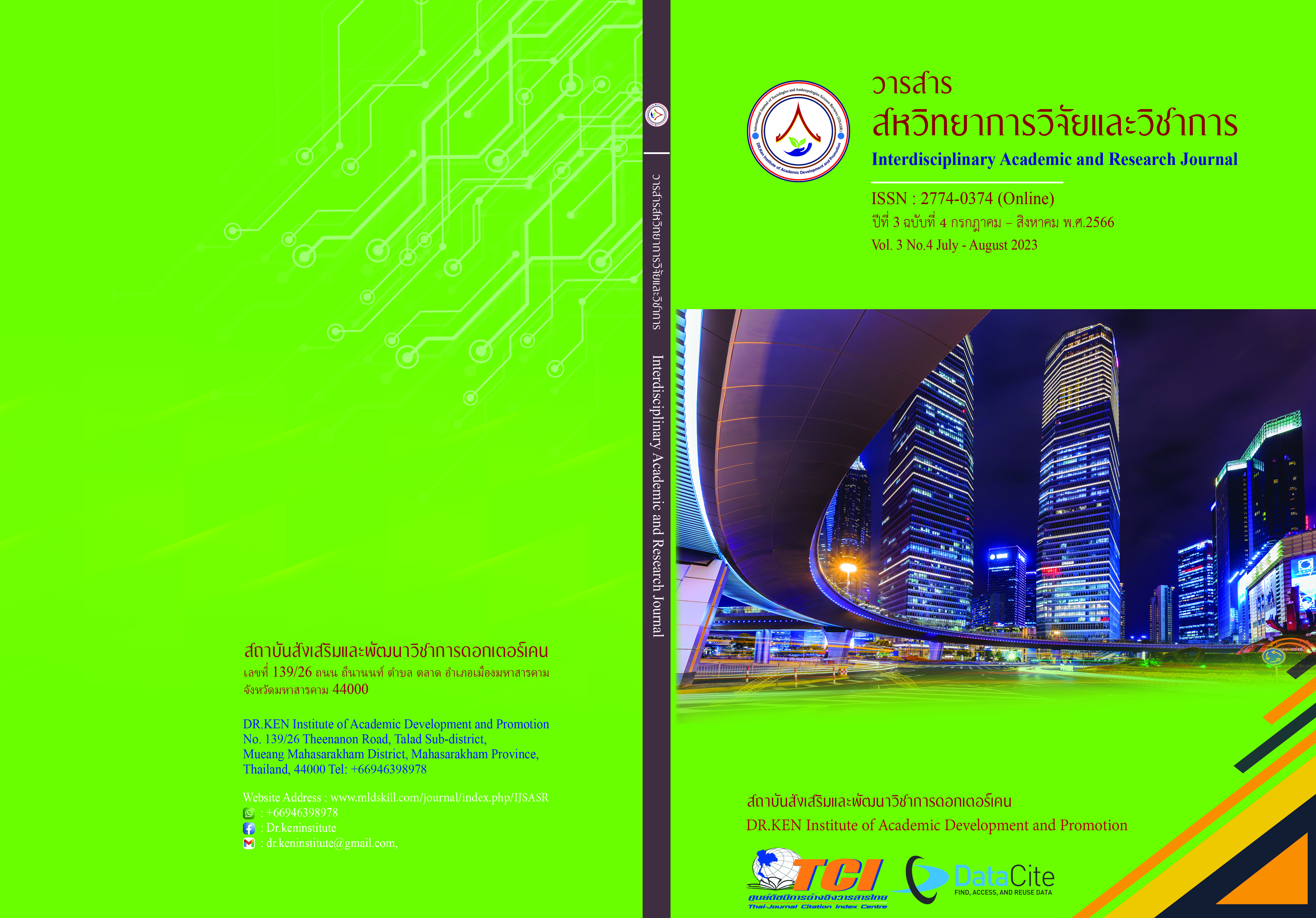The Development of a Professional Standard Assessment Model for the Automotive Technology Department in Educational Institutions under the Office of Vocational Education Commission
DOI:
https://doi.org/10.14456/iarj.2023.213Keywords:
Professional Standard Assessment; , Automotive Technology;, Vocational EducationAbstract
Reform of vocational education management to focus on developing workers to be able to operate their businesses and focus on producing manpower to truly meet the needs of the labor market. Therefore, the creation of professional standard assessment tools for graduate students of the Office of the Vocational Education Commission will be consistent with professional standards for each type of subject and field and is one of the indicators of student success. The purpose of this research was to develop a professional standard assessment model in the field of automotive technology for educational institutions. The researcher conducted the research according to the research and development process, which was carried out in 4 phases as follows: Phase 1: Study documents and interviews with five experts about professional standard assessment guidelines in the field of automotive technology at the colleges. Phase 2: Develop a model for assessing professional standards in automotive technology in educational institutions and examine its feasibility and suitability with 9 experts, including preparing an assessment manual. Phase 3: Examine the results of the experimental model for professional standard assessment in the field of automotive technology with 31 students from Kalasin Technical College, Roi Et Vocational College, and Nawaminthrachinee Mukdahan Industrial and Community Education College, as well as check the validity of the assessment results with the results of the training experience. Phase 4: Examine the results of the professional standard model assessment in the field of automotive technology in terms of utilization and correctness, with Phase 3 and Phase 4 involving college administrators, automotive technology teachers, and workplace trainers. Participate as a test user and evaluate the model. The research results found that: (1) it was determined that the assessment objective consists of 4 components, 4 key indicators, and 26 sub-indicators which have guidelines for evaluating professional standards in the field of automotive technology according to the National Vocational Education Qualifications Standards of 1983, college administrators, automotive technology teachers, and workplace trainers are required to be appraisers and use absolute criteria as criteria for evaluation. (2) Results of the development of a professional standard assessment model in the field of automotive technology in educational institutions revealed that there were 5 components, namely the assessment's objectives, what was assessed, method of evaluation, evaluator, and evaluation criteria. The assessment consists of 4 components, 4 main indicators, and 22 sub-indicators. (3) Results of the trial of the professional standard assessment model in the field of automotive technology with the students who were assessed indicated that the highest evaluation score was 520 points or 94.43%, and the lowest evaluation score was 503 points, or 87.47%, which was at the very best level for 11 individuals, or 35.48 percent of the assesses. 20 individuals, representing 64.51 percent of those who were evaluated, received excellent evaluation results. The results of verifying the validity of the professional standard assessment results in the field of automotive technology of educational institutions are consistent with the result of training experience evaluation (87.09%). And (4) Evaluation results of the professional standard assessment form in the field of automotive technology as overall was at the highest level. The average score was 4.74, with a standard deviation of 0.00 for each side. It was found that all aspects were at their highest level of utilization. The mean score was 4.73, the standard deviation was 0.026, and the accuracy was 4.75. The average score was 4.75, and the standard deviation was 0.151.
References
ชมพูนุท เมฆเมืองทอง. (2554). การพัฒนารูปแบบฝึกอบรมการสร้างแบบทดสอบมาตรฐานวิชาชีพ. วารสารมหาวิทยาลัยราชภัฏมหาสารคาม, 5(2), 117- 130.
เชาว์ อินใย. (2553). การประเมินโครงการ. กรุงเทพฯ : สำนักพิมพ์แห่งจุฬาลงกรณ์มหาวิทยาลัย.
ธีรศักดิ์ อัครบวร. (2542). ความเป็นครู. กรุงเทพมหานคร : โรงพิมพ์ ก.สายธาร.
บุญชม ศรีสะอาด. (2543). การวิจัยทางการวัดผลและประเมินผล. กรุงเทพ ฯ : สุวีริยาสาส์น.
พิสณุ ฟองศรี. (2551). การประเมินทางการศึกษา : แนวคิดสู่การปฏิบัติ (พิมพ์ครั้งที่ 5). กรุงเทพฯ : บริษัท ด่านสุทธาการพิมพ์ จำกัด.
ไพศาล วรคำ. (2554).การวิจัยทางการศึกษา. มหาสารคาม : คณะครุศาสตร์ มหาวิทยาลัยราชภัฏมหาสารคาม.
รัตนะ บัวสนธ์. (2550). ทิศทางและอาณาบริเวณการประเมิน (พิมพ์ครั้งที่ 2). กรุงเทพฯ : วี. พริ้น (1991).
ศิริชัย กาญจนวาสี. (2554). ทฤษฎีการประเมิน. กรุงเทพฯ : สำนักพิมพ์แห่งจุฬาลงกรณ์มหาวิทยาลัย.
สถาบันคุณวุฒิวิชาชีพ (องค์การมหาชน). (2558). มาตรฐานอาชีพในสาขาวิชาชีพบริการยานยนต์. กรุงเทพฯ : สถาบันคุณวุฒิวิชาชีพ (องค์การมหาชน)
สถาบันพัฒนาฝีมือแรงงานแห่งชาติ. (2560). ฝีมือแรงงานแห่งชาติ สาขา เทคโนโลยียานยนต์. กรุงเทพฯ : สถาบันพัฒนาฝีมือแรงงานแห่งชาติ.
สวนันท์ แดงประเสริฐ และภาวพรรณ ขำทับ. (2562). การพัฒนาโครงสร้างหลักสูตรฐานสมรรถนะตามมาตรฐานอาชีพ. วารสารพัฒนาเทคนิคศึกษา. 32(112), 27-36.
สำนักงานคณะกรรมการการอาชีวะศึกษา. (2562). หลักเกณฑ์และแนวปฏิบัติการจัดการอาชีวศึกษา ระดับประกาศนียบัตรวิชาชีพและระดับประกาศนียบัตรวิชาชีพชั้นสูง. กรุงเทพฯ : สำนักงานคณะกรรมการการอาชีวะศึกษา.
สำนักงานเลขาธิการคุรุสภา. (2548). มาตรฐานวิชาชีพทางการศึกษา. กรุงเทพฯ : สำนักงานเลขาธิการคุรุสภา.
สำนักมาตรฐานการอาชีวศึกษาและวิชาชีพ สำนักงานคณะกรรมการการอาชีวศึกษา. (2547). การประเมินผลการเรียนตามหลักสูตรประกาศนียบัตรวิชาชีพ พุทธศักราช 2545 พ.ศ. 2547. กรุงเทพฯ : สำนักมาตรฐานการอาชีวศึกษาและวิชาชีพ สำนักงานคณะกรรมการการอาชีวศึกษา.
Frovihandika, D., (2019). A Suitability Of Competency Certification Scheme For Automotive Vocational High School With LSP P1 Against Business and Industrial World Needs In Semarang City. Proceedings of the International Conference on Educational Research and Innovation (ICERI 2019), 119-127.
Nurtanto, M., (2020). The Effect of STEM-EDP in Professional Learning on Automotive Engineering Competence in Vocational High School. Journal for the Education of Gifted Young Scientists, 8(2), 633-649.
Downloads
Published
How to Cite
Issue
Section
License
Copyright (c) 2023 Wisit Duanghassadee, Piyatida Panya , Arun Suikraduang

This work is licensed under a Creative Commons Attribution-NonCommercial-NoDerivatives 4.0 International License.
Copyright on any article in the Interdisciplinary Academic and Research Journal is retained by the author(s) under the under the Creative Commons Attribution-NonCommercial-NoDerivatives 4.0 International License. Permission to use text, content, images, etc. of publication. Any user to read, download, copy, distribute, print, search, or link to the full texts of articles, crawl them for indexing, pass them as data to software, or use them for any other lawful purpose. But do not use it for commercial use or with the intent to benefit any business.
















.png)


